#black farmers
Explore tagged Tumblr posts
Text
Get your meat directly from a farm and right to your table! 😆🥩 @swansonfamilyfarm proud to offer quarter, half, and whole cow beef shares—a sustainable, farm-to-table option for high-quality meat straight from the source. By supporting Swanson Family Farm, you’re empowering local farms, fostering food security, and contributing to a lasting impact on agriculture.
Ready to stock your freezer with premium beef? Visit swansonfamilyfarmllc.com to learn more and be part of their growing community of supporters! 🌱💪
Over the last decade, Swanson Family Farm has worked hard to connect family farms across the country, providing nutrient-dense food and supporting farmer-led, farm-based training programs. 🐄✨
@successisus_
#farm#farmers#black farmers#black owned businesses#support black owned#black owned business#black business#black economics#black owned#black entrepreneurs#black excellence#entrepreneur#food#georgia#carnivore#carnivore diet#business owner#black health#b1#black people#black power#black empowerment#black liberation#black lives matter
259 notes
·
View notes
Text
youtube
White farmers are now facing what black farmers have been facing for generations.
#us politics#donald trump#fuck trump#project 2025#fight project 2025#fuck republicans#fuck conservatives#republicans are domestic terrorists#survive out of spite#republicans are evil#us farmers#black history is american history#black history#black farmers#maga fafo#us history#fafo season#fafo#fuck around and find out#Youtube
28 notes
·
View notes
Text


So this journey into accepting my disability and trying to get the adaptive tech I need to continue farming has been difficult, enlightening, and LOOOOONNNNGGG. I'm not done yet, but thanks to community, I'm well on my way. The gofundme campaign was really successful, and I've got a lot of humble gratitude for the people that keep believing in me and this vision for the Farm.




Usually can't haul a hay bale that far worth a lick without a ton of pain, so being able to move that way, even as my arms get used to the impact, was pretty incredible.
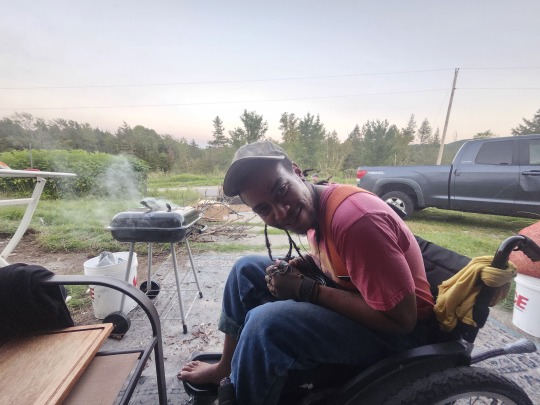
Here for Universally Accessible Farming and all it takes to try and keep trying to implement that here on the land. If yr interested in the kind of wheelchair I'm currently using across uneven surfaces, grass and dirt -- see here. Still trying to figure out how to climb and incline well.
All part of the journey.
KX
32 notes
·
View notes
Text
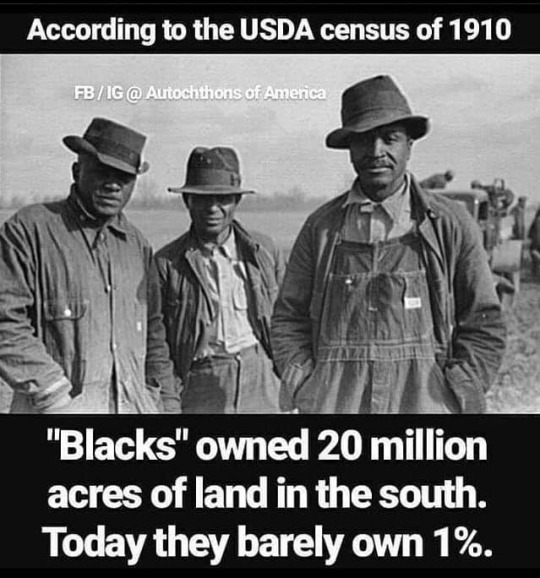
313 notes
·
View notes
Text
FYI!!!
The Black Farmers Index!! Find local farmers near you or who might ship to you!
14 notes
·
View notes
Text
I found a wonderful painting yesterday at an antiques mall.
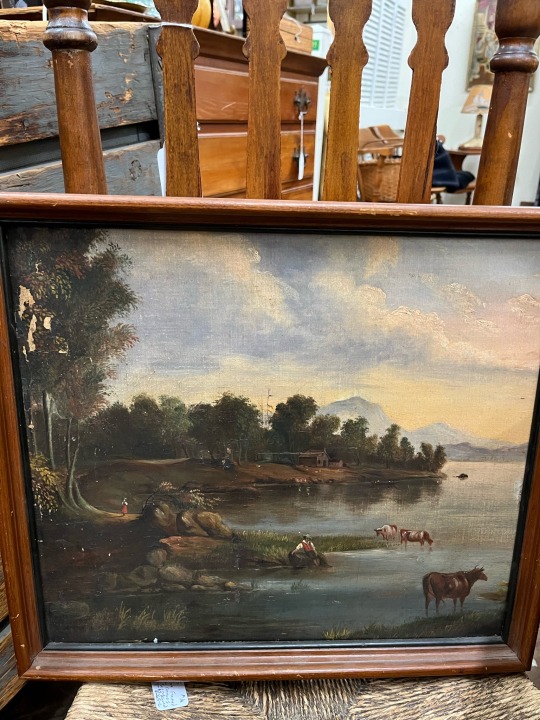
It’s a pretty typical pastoral painting from the 1800s, with one exception: the figures in the painting are all people of color.
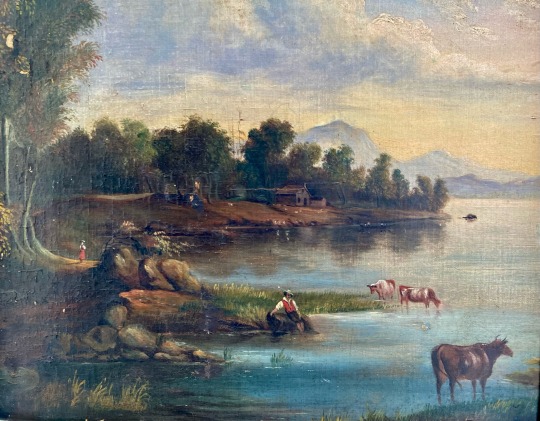
From the young man in the foreground watering the cows in the river, to the woman in sunlight on the left, making her way back to the tidy little house under the trees, to the far-off figures in the boat preparing to land on the shore in front of the house—all are people of color.
I especially like the young man. There is something wonderful about his relaxed but confident posture, the way he’s cocked his wide-brimmed hat, his bright red weskit.

So I bought the painting. It’s hanging in our dining room, where we are lucky enough to be able to see it every day. I love it.
44 notes
·
View notes
Video
tumblr
Black Farmers
the 1619 podcast has a great episode about Black Farmers https://www.nytimes.com/2019/10/04/podcasts/1619-slavery-sugar-farm-land.html?
In the fall of 1864 at the height of the Civil War, one of the most famous Union generals, William Tecumseh Sherman, begins his march out of the city of Atlanta to the sea.
And as Sherman and his men make their way through Georgia, black Southerners are seeing an opportunity.
And so by the thousands, they start to leave the plantations where they’ve been enslaved and are falling behind Sherman’s troops as they make their way to the coast.
But these newly liberated people were not exactly welcomed. Sherman didn’t actually oppose slavery, and so he’s really not that sympathetic to those who are fleeing these plantations, and he also sees them as a drain on his resources. They are families. They are people of all ages, young and old, who need food and care, and they are slowing the troops down.
By December of that year, some of Sherman’s troops are about to approach Savannah, and they come upon a creek that is both too wide and too deep to cross without a bridge. So the troops start building one, and they instruct the black people who are following them to just wait, that the troops need to cross first, but then they’ll be able to come after. But the Confederate Army is on their heels, and once the Union troops cross, they break up the bridge, leaving all those people who had just escaped slavery behind to face either the icy waters or the rebel army that was in pursuit.
It is a massacre. Some of them drown trying to swim across. Others are trampled or shot to death, and those who remain are captured and re-enslaved. When word gets back to Lincoln’s secretary of war, Edwin Stanton, he is outraged. He has Sherman pull together a meeting with 20 black church leaders. There’s a transcript of this meeting, and it shows that these two men, Stanton and Sherman, actually turned to this group of black leaders and asked them, what do you want for your own people?
Speaking for the group, one of the men tells them, “The way we can best take care of ourselves is to have land, and turn it and till it by our own labor — that is, by the labor of the women and children and old men, and we can soon maintain ourselves and have something to spare.”
And what’s remarkable is that Sherman turns that request of those men for land to work for themselves into a government order, Special Order No. 15. It said that the government would take 400,000 acres that it had seized from the Confederacy and split it up among those thousands of newly emancipated people. This becomes what is perhaps the most famous provision of the Reconstruction period, which we all know as 40 acres and a mule. President Lincoln approves the order, but soon after, he’s assassinated. And Andrew Johnson, a Southerner who had once enslaved people himself, takes over the presidency and quickly overturns it. And within a few short months, the small amount of land that had been distributed to black people was returned to white Southerners.
#tiktok#farmers#black farmers#podcast#farming#history#USDA#civil rights#reagan was a terrible president#us history
137 notes
·
View notes
Text
blackfarmersindex.com
farmfresh247.com
#black farmers#farmers#farmlife#support black businesses#black owned business#black owned businesses#black owned brands#black economics#black business#entrepreneur#business owner#black owned#black entrepreneurs#support black owned#black excellence#food#farming#food deserts#black community#black liberation#black people#black power#black unity#black americans#black culture#soul food
73 notes
·
View notes
Link
The National Black Farmers Association (NBFA) is calling for the immediate resignation of Tractor Supply President Hal Lawton following the company's recent decision to cut diversity-focused positions and withdraw its carbon-emissions goals in response to right-wing pressure.
11 notes
·
View notes
Text
MORE Black Food History
youtube
#black history#black people#blacklivesmatter#black lives matter#soul food#food#foodindustry#black farmers#black grocery stores#black owned business#black owned businesses#black entrepreneurs#black excellence#entreprenuership#black business#black health#racial injustice#africa#black history 365#black history month#black liberation#black pride#black unity#Youtube
22 notes
·
View notes
Text
youtube
There are so many barriers in place when it comes to growing food in cities, but education and lack of access to space are the hardest to overcome. Yemi Amu has dedicated her life as a farmer to solving this problem, by starting the only Aquaponics farm in NYC. Oko Farms in Brooklyn is both a working farm which provides fresh food to surrounding neighborhoods, while also actively engaging the public in education on how to grow food for yourself in urban environments.
#PBS Terra#solarpunk#aquaponics#USA#new york#new york city#brooklyn#Yemi Amu#food security#farmer#black farmers#farming#aquaponics farm#Oko Farms#urban gardening#urban farming#Youtube
10 notes
·
View notes
Text







HARVESTING SCAPES!

Mid to late June saw our first garlic scapes. Last year, I didn't realize that trimming the scapes encouraged larger bulb growth. Even though i was able to seed from our own garlic, we did not get the yield that we could have gotten.

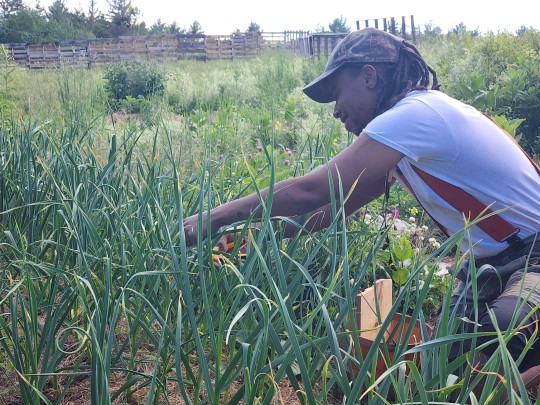
This year, we hope to see a better harvest, and last year weren't too bad. If this year proves successful enough to produce for us, close community AND the store, we'll be able to treat garlic as a specialty crop in our area.
garlic head,
KX
10 notes
·
View notes
Text

"Tuckered out..."
A farmer and his grandson in Greensboro, North Carolina in 1941.
Ilovethis🖤🖤
#blackhistory#black and beautiful#african american#blackart#paved the way#grandpa#grandson#sleepy lad#dapper black men#menshats#1941#north carolina#black farmers#hardworkers#restingontheporch#pipetime#overalls#kinkyhair#suspenders
36 notes
·
View notes
Video
youtube
Farmers Aren’t Allowed To Reuse Or Save Their Seeds |Tiktok Rants Big Corp
3 notes
·
View notes


